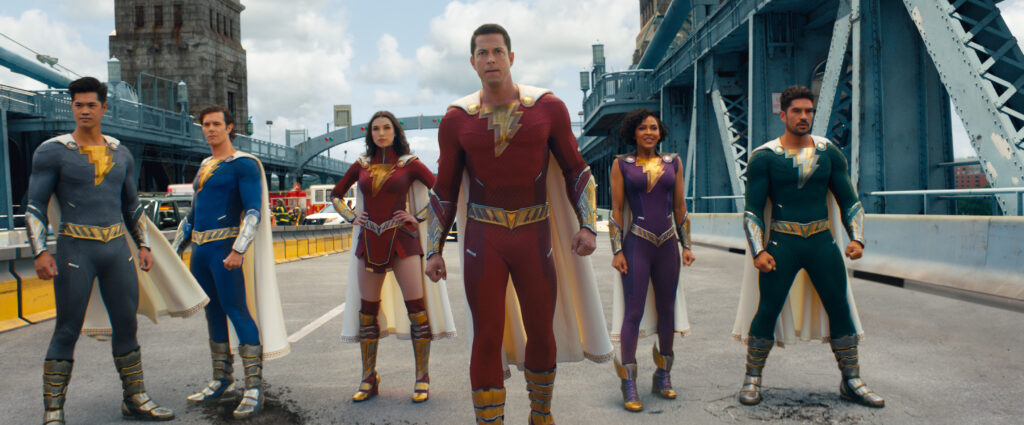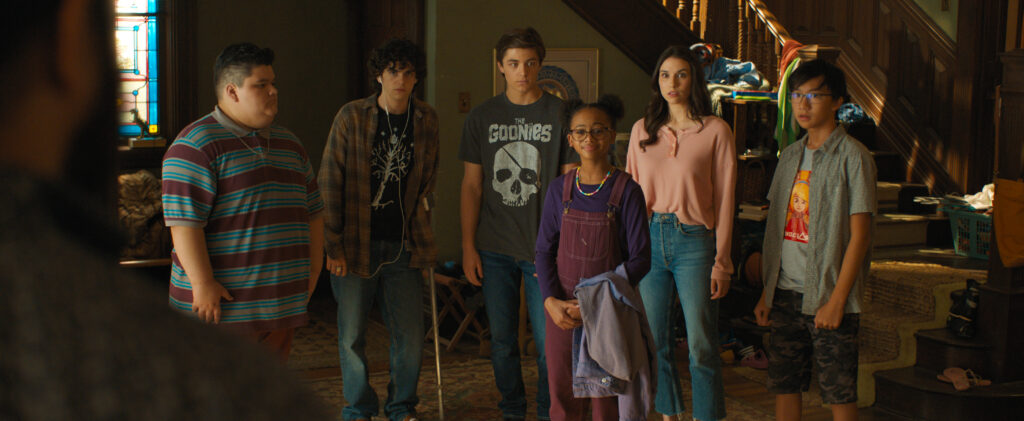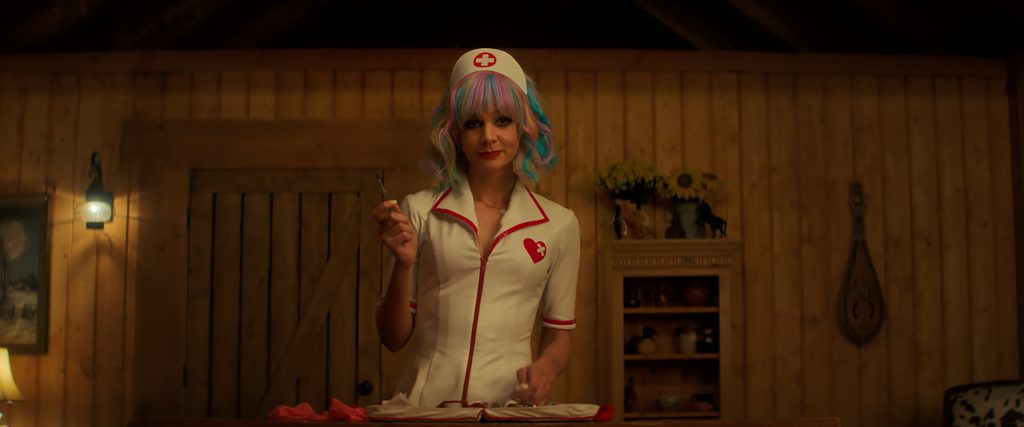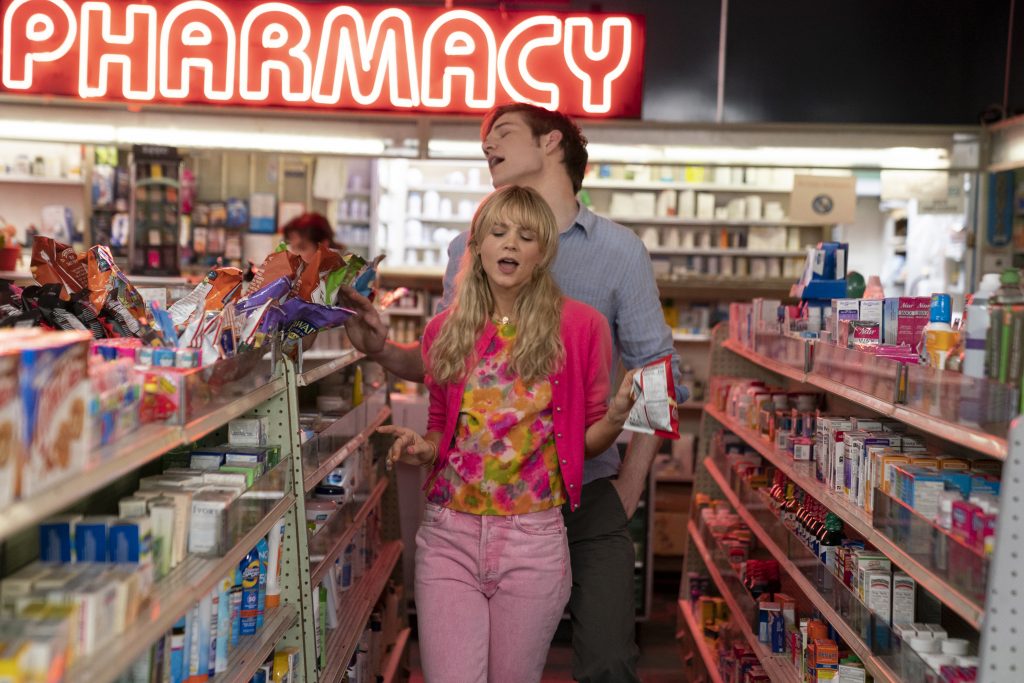March 15, 2023
by Carla Hay

Directed by David F. Samberg
Culture Representation: Taking place in Philadelphia, the superhero action film “Shazam! Fury of the Gods” features a racially diverse cast of characters (white, Asian, African American and Latino) portraying superheroes and regular human beings.
Culture Clash: Billy Batson, who transforms from being a teenager to an adult superhero named Shazam, leads his teenage foster siblings (who have similar superhero transformation abilities) in battling against three daughters of the god Atlas who want to retrieve the powers that the Shazam family has.
Culture Audience: “Shazam! Fury of the Gods” will appeal primarily to people who are fans of the movie’s headliners, movies based on DC Comics, and the 2019 movie “Shazam!,” but “Shazam! Fury of the Gods” is yet another sequel that is inferior to the original movie.

“Shazam! Fury of the Gods” loses much of the charm of 2019’s “Shazam!,” by overloading on bad jokes, cluttered storylines and formulaic action scenes. It’s a failed attempt to be a wisecracking, high-quality superhero movie. This movie sequel’s visual effects are also unimpressive, as several scenes make it too obvious where the “green screens” were located to put the computer generated imagery (CGI) in post-production. Much of the movie’s dialogue is cringeworthy, most of the performances are trite, and the cliché-ridden story has no surprises.
The movie didn’t have to be this disappointing. “Shazam! Fury of the Gods” features many of the same team members who made “Shazam!,” including director David F. Samberg, screenwriter Henry Gayden, producer Peter Safran, film editor Michel Aller and most of the principal cast members. However, “Shazam! Fury of the Gods” added a screenwriter—Chris Morgan (“Fast & Furious Presents: Hobbs & Shaw,” “The Fate of the Furious”)—and changed cinematographers, production designers, and visual effects supervisors. The changes did not result in a better movie.
The “Shazam!” movies are based on DC Comics characters. “Shazam! Fury of the Gods” has all the qualities of a dull and mindless sitcom, thereby making the forced comedy look very awkward in what’s supposed to be an exciting superhero movie. And for a movie with such a simple plot, “Shazam! Fury of the Gods” keeps muddling the story with unnecessary subplots and pointless scenes. There are simply too many underdeveloped characters in this movie. Most of these characters don’t have memorable personalities; they have forgettable soundbites.
“Shazam! Fury of the Gods” (which takes place in Philadelphia) picks up three years after the events of “Shazam!” Billy Batson (played by Asher Angel) is now 17 years old. He is still living with a secret that most people don’t know: He can transform into an adult superhero named Shazam when he yells the word “Shazam!” Billy is living in a foster family with other teenagers, whom he considers to be just like siblings. As shown in “Shazam!,” these foster siblings have similar abilities to transform into adult superheroes. Billy is the leader of this group.
Billy/Shazam’s superhero pals are goofy Freddy Freeman (played by Jack Dylan Grazer), who can transform into Super Hero Freddy (played by Adam Brody); sweet-natured Darla Dudley (played by Faithe Herman), who can transform into Super Hero Darla (played by Meagan Good); intelligent Mary Broomfield (played by Grace Caroline Currey), who can transform into Super Hero Mary (also played by Currey); introverted Pedro Pena (played by Ovan Armand), who can transform into Super Hero Pedro (played by D.J. Cotrona); and earnest Eugene Choi (played by Ian Chen), who can transform into Super Hero Eugene (played by Ross Butler). These friends/foster siblings have made a pact not to perform any superhero duties without each other.
In most teenage superhero stories, these superheroes are orphans or have at least one deceased parent. The guardians of these teen superheroes usually don’t know about the teenager’s special powers, but they eventually find out. After all, there are only so many times that it can be believable that a parent or guardian does not notice that their teenager isn’t around at the same time a superhero is on live television committing an act of heroism. In “Shazam! Fury of the Gods!,” there are six teenage superheroes in the household. It stretches the bounds of credibility that their foster parents Victor Vasquez (played by Cooper Andrews) and Rosa Vasquez (played by Marta Milans) would take so long to notice.
“Shazam! Fury of the Gods” brings some Greek mythology to the story, by having three daughters of the Greek god Atlas (the Guarder of the Tree of Life) on a revenge mission to get back the mystical powers that were stolen from them by an enigmatic sorcerer named Wizard (played by Djimon Hounsou), who is shown in a prison in the beginning of the movie. The three sisters are Hespera (played by Helen Mirren), who has the power of the elements that can affect the weather; Kalypso (played by Lucy Liu), who has the power of chaos that can affect mind control; and Anthea (played by Rachel Zegler), who has the power of axis that can affect the rotation of Earth.
Near the beginning of the movie, Hespera (who is the leader of this trio of sisters) and Kalypso are seen invading a museum, where they use their powers and steal a wooden staff that was locked in a glass case. Hespera and Kalypso then pay a hostile visit to the Wizard in his prison cell. The sisters have brought the wooden staff, which they force the Wizard to hold while he says, “Shazam!” This act is supposed to lead the sisters to the keeper of the stolen powers. And it leads them right to Shazam.
And where is Anthea? It just so happens that there’s a new student at the high school attended by Billy and his pals. Her name is Ann (also played by Zegler), who appears to be kind and compassionate. Freddy is instantly smitten, but there are repetitive scenes where Freddy (who uses an arm brace) is brutally attacked by school bullies Brett Breyer (played by Carson MacCormac) and Burke Breyer (by Evan Marsh), two brothers who also want Ann’s attention. Brett and Burke humiliate Freddy by physically assaulting him in front of Ann. The movie weirdly has Freddy accept this abuse with a smile, because Freddy says that all that matters to him is that Ann likes him.
Meanwhile, Billy/Shazam has his own crush: Wonder Woman. There’s another misguided scene where Billy is having a fantasy that he (as Shazam) is on a dinner date with Wonder Woman, who is not facing the camera. (In other words, they didn’t get “Wonder Woman” movie actress Gal Gadot for this scene.) All of sudden, when she is facing the camera, she has the face of the Wizard, who has an important message for Billy/Shazam. This scene is supposed to be amusing, but the visual effects just make everything look bizarre and misplaced.
Billy/Shazam is also going through an identity crisis. As Shazam, he is seen in the office of pediatrician Dr. Dario Bava (played by P.J. Byrne) and treating this appointment like he’s in a a psychiatric therapy session. While lying down on a couch, Shazam whines, “I feel like a fraud.” He also says that he feels rejected by his parents, rejected by the system, and rejected by the city. Shazam also has an inferiority complex because the Flash superhero (another DC Comics character who wears a red superhero suit with a lightning bolt) is more famous than Shazam. When Dr. Bava tactfully reminds Shazam that he’s a pediatrician, not a psychiatrist, Shazam keeps whining.
Not long after this not-very-funny scene, the superhero pals go to rescue people from a collapsing Benjamin Franklin Bridge. It’s a scene where Bonnie Tyler’s 1984 song “Holding Out for a Hero” is playing, and the characters joke about it in a meta way that is not very cute. Fortunately, there are no fatalities during this disaster, but the bridge has completely collapsed. The news media and the general public blame Shazam and his superhero friends for not being able to save the bridge, so the superheroes are called the Philadelphia Fiascos. It doesn’t make any sense that the superheroes would be vilified for not saving the bridge when the superheroes chose saving people’s lives as the top priority.
The Philly Fiascos label is just another excuse for the movie to make Billy/Shazam feel sorry for himself. He also thinks he’s losing the respect of the superhero group of friends. There’s a useless subplot about Freddy going out on his own to fight a crime as Super Hero Freddy. Billy/Shazam finds out about it, so there’s more pouting, whining and complaining from this character, as he lectures Freddy about team unity and not breaking their group pact.
Billy is about to turn 18 soon. Victor and Rosa will lose foster care government funding for each child that turns 18, also known as aging out of the child welfare system. These foster parents have told Billy that they can’t financially afford to have him in the house after he’s legally an adult. Billy feels even more insecure about losing his home, because Victor and Rosa have decided to let Mary stay in the household after she turned 18.
The foster parents made an exception for Mary, because the foster parents say they can afford to have only one other adult in the household. Mary just happened to have the luck of turning 18 first out of all six foster kids. And because Billy/Shazam is somewhat competitive with Mary (because he’s insecure about her being smarter than he is), you know what that means: More pouting, more whining and more complaining from Billy/Shazam.
What happened to the fun-loving Shazam from the first “Shazam!” movie? He can be seen occasionally in “Shazam! Fury of the Gods,” but he’s mostly turned into a neurotic annoyance who tells so many horrible, unfunny jokes, it would embarrass even the most amateur stand-up comedian in a low-rent, obscure nightclub. There’s a very unoriginal joke about “The Fast and the Furious” movie franchise, which seems like more like a shameless plug from “Shazam! Fury of the Gods” co-writer Morgan, who’s been a screenwriter for a few movies from “The Fast and the Furious” franchise. When Billy/Shazam isn’t fretting about not being perceived as an “alpha male,” he’s fixated on the idea of dating Wonder Woman. This movie is not subtle at all about why Wonder Woman is mentioned so many times.
“Shazam! Fury of the Gods” also has tone-deaf, sexist jokes about women’s ages. Someone insults Hespera by saying she looks too old to be Kalypso’s sister, and questions if these two sisters are even from the same family. The dolt who makes this asinine remark apparently doesn’t know that gods and goddesses in Greek mythology can live for centuries and can therefore become parents of children with significant age gaps. There’s also a stupid crack that Billy makes about how Wonder Woman will no longer be too old for him when he turns 18.
It goes on and on with simple-minded dialogue and unimaginative action scenes in “Shazam! Fury of the Gods.” A lot of it is actually quite boring, compared to the abundance of better superhero movies that exist. Viewers will learn nothing that’s new or interesting about Billy/Shazam, unless you think it’s fascinating that he sure knows how to complain a lot if people don’t treat him like a rock star. Levi and Asher are just treading in shallow waters with the Shazam and Billy characters in this movie, when the filmmakers could have given them a deeper and more adventurous dive.
“Shazam! Fury of the Gods” also missed several opportunities to have more character development for supporting characters Mary, Darla, Pedro and Eugene, who are all written and portrayed as generic as generic can be. Finding out that Pedro has a crush on a baseball outfielder named Marshall Wade (as briefly shown in one of the movie’s early scenes) does not count as character development, since it’s already well-known among DC Comics fans that Pedro is gay. Freddy, who is supposed to be the funniest character in the “Shazam!” movies, just kind of drifts along, while Grazer does his best to make the weak material work in “Shazam! Fury of the Gods.”
As for Mirren, Liu and Zegler, they are perfectly satisfactory in their roles as the vengeful daughters of Atlas, but they are not outstanding in the movie. Mirren looks a little bored. Liu is a little too campy in her role. Zegler just looks happy to be there, since “Shazam! Fury of the Gods” is only her second movie, after she made an impressive movie debut with a starring role in the 2021 remake of “West Side Story.” Simply put: The performances of Mirren, Liu and Zegler in “Shazam! Fury of the Gods” are not going to be considered iconic in the DC Extended Universe.
“Shazam! Fury of the Gods” has a blockbuster movie budget but all that money is wasted on a story that has the quality of a third-rate kiddie cartoon. The movie’s plot is stretched out to nearly 132 minutes when it could have easily been 90 minutes or less. “Shazam! Fury of the Gods” gives the impression that the filmmakers from 2019’s “Shazam!” were so impressed with themselves because “Shazam!” was a hit with most fans and most critics, so the filmmakers didn’t bother to make a better sequel and are just coasting on the success of a “Shazam!” movie that was made several years ago.
Movie audiences have come to expect a certain level of cinematic quality for these superhero movies, which don’t always have to be super-serious. But the superhero movies that want to be comedic should at least fulfill the basic requirement of being funny and entertaining. In that regard, “Shazam! Fury of the Gods” misses the mark by a long distance.
The movie’s mid-credits scene is a reference to HBO Max’s “Peacemaker” series, while the movie’s end-credits scene features a character who was in the 2019 “Shazam!” movie. The DC Extended Universe is undergoing a massive overhaul under DC Studios’ co-chairmen/CEOs James Gunn and Peter Safran, including recasting of several major DC Comics characters. In other words, this incarnation of the “Shazam!” franchise is going out with a whimper (and a lot of whining from Shazam), because the next “Shazam!” movie is getting a much-needed revamp with a new team.
Warner Bros. Pictures will release “Shazam! Fury of the Gods” in U.S. cinemas on March 17, 2023.


